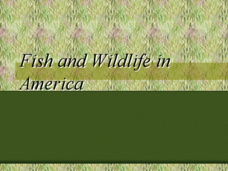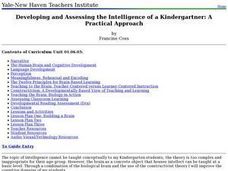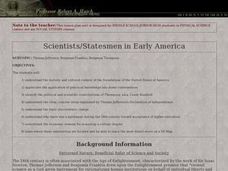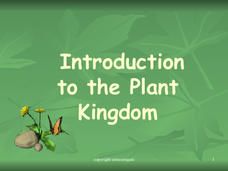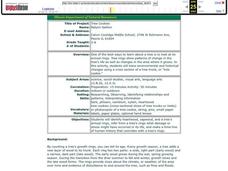Howard Hughes Medical Institute
Explore Your Inner Animals
Human bodies prove evolution thanks to our genes, bones, and more. Learning about specific body parts and how they evolved from other species helps individuals better understand the transition species that helped us become who we are today.
Curated OER
Skin Cancer Investigation: A Multi-Component Project
Students compare the perceived and actual risks of getting skin cancer, while looking at ways to minimize these risks. They may have very little grasp of the severity of the threat of skin cancer or be unaware of the increase in the...
Curated OER
Fish and Wildlife in America
Some of the details of the use of wildlife as food and crop resources are given at the beginning of this slideshow. Next, the historical problems with wildlife are explained, as are some mistakes that have been made leading to extinction...
Texas State Energy Conservation Office
Investigation: Automotive Emissions and the Greenhouse Effect
It is recommended that you conduct this fabulous experiment as a whole-class demonstration. Collect air samples from the environment, human exhalation, and car exhaust, then compare them for carbon dioxide content using bromthymol blue...
Curated OER
Energy Through the Ages
In this energy through the ages worksheet, students read about the history of energy use beginning with early civilization and the use of water wheels for the production of energy to hydrocarbon-based coal, oil and natural gas of today....
Perkins School for the Blind
Learning to Identify Sounds Made by the Body
Sneeze, snap, tap, and whistle; Did I do that? Explore the parts and sounds of the human body with your learners with visual impairments. First you'll name the parts of the body, make a sound with each part, and then have the class guess...
American Museum of Natural History
Race to the South Pole
Antarctica was the last continent humans explored. Explore how two teams raced to be the first using an interactive online lesson. Users learn about the climate challenges and how the teams sought to overcome them. The resource is...
Curated OER
Developing and Assessing the Intelligence of a Kindergartner: A Practical Approach
Students name objects that are the same size, shape, and weight as the human brain. They touch the model brain, feeling the folds, etc. They make connections to the chart displaying the brain-like objects. They touch the 'potato flake'...
Curated OER
The Aerial Age
Students infer America's attitude towards aviation in the early 1900s. In this The Aerial Age instructional activity, students analyze early 1900s literature, music, advertisements, and popular culture in reference to aviation. Students...
Curated OER
Stages of Life
High schoolers investigate the eight stages of human development. In this stages of life instructional activity students discuss as a class the stages and complete an activity.
Curated OER
Do Not Bleach!
Students explore the importance of protecting the coral reefs. In this Oceanography lesson plan, student examine how coral reefs benefit humans, identify major threats to the reefs, and discuss actions to reduce these threats.
Curated OER
Scientists and Inventors
Students explore human discovery by reading historical stories in class. In this inventors lesson, students define the terms scientist, invention, inventor and discovery before discussing the many differences between them. Students read...
Curated OER
Yerbas y Remdios: A New Look
Students explore human health by participating in a medicine class activity. In this herbs lesson, students identify plants which Native Americans used throughout history to cure illnesses. Students research specific herbs in groups and...
Curated OER
Famous Rock Groups
Students define igneous, metamorphic, and sedimentary, and use rock identification books to identify igneous, metamorphic, and sedimentary rocks. Students then discuss which rocks early man would have found useful for tool creation.
Curated OER
Scientists and Statesmen in Early America
Explore the historic and cultural context of the foundations of the United States of America. They identify the political and scientific contributions of early American scientists.
Curated OER
Recycled Treasures
Students develop creative-thinking skills that they will use repeatedly throughout their life. In this early childhood art lesson plan, students develop creative-thinking, social-development, and language skills, and an awareness of the...
Curated OER
Cloudy with a Chance of Meatballs
Students explore the 5 themes of geography. In this cross curriculum literacy and geography instructional activity, students listen to Cloudy with a Chance of Meatballs by Judi Barrett, and make a list of the needs of the people in...
Biology Junction
Introduction to the Plant Kingdom
Plants provide humans with food, shelter, and medications. Scholars gain a better appreciation for plants after learning their functions, divisions, and early ancestors. Each sub-topic includes slides highlighting vocabulary and...
School Science
The Big Bang Time Machine
Scholars take off on an interactive spaceship to explore a historical timeline of the big bang theory. They learn about the evolution of mammals and humans, the formation of stars and planets, and the chemical composition of the early...
Curated OER
I Wonder What Would Happen if Lots of Manduca Lived in a Small Place...
Students discuss the reasons why humans fight and look for similiarties in animals. They make predictions on what they think will happen when they observe insect crowding. They make conclusions about their predictions to end the activity.
Curated OER
Tree Cookies
Students identify heartwood, sapwood, and a tree's annual rings, infer from a tree's rings what damage or stress might have occurred in its life, and make a time-line of human history that coincides with a tree's rings.
Curated OER
Zebrafish Development
Students examine the early development of zebrafish as a model for embryo development in humans. They observe various stages of zebrafish reproduction from sperm and eggs to fertilized eggs and hatchlings.
Curated OER
Biotechnology
A continuous cascade of information comes through this PowerPoint on biotechnology. The topic is defined, a history is presented, and basic genetic engineering techniques are explained. The topic is covered in an objective manner,...
Curated OER
Primate Evolution
A short slide show lists the unique adaptations of primates, introduces early primates, and examines hominid evolution. Consider adding some drawings or graphics to enliven the presentation.
Other popular searches
- Timeline of Early Man
- Early Man Neanderthal
- Time Line of Early Man
- Powerpoint Early Man
- Cultures of Early Humans
- History Early Man
- Social Studies Early Humans
- Early Humans Wanted Poster
- Early Man Rock Art
- Early Humans Africa
- Early Man Africa
- Timelines of Early Man




